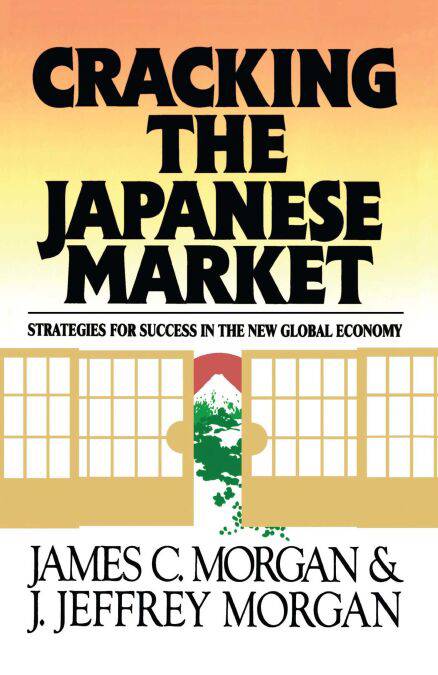
- Retrait gratuit dans votre magasin Club
- 7.000.000 titres dans notre catalogue
- Payer en toute sécurité
- Toujours un magasin près de chez vous
- Retrait gratuit dans votre magasin Club
- 7.000.0000 titres dans notre catalogue
- Payer en toute sécurité
- Toujours un magasin près de chez vous
Cracking the Japanese Market EBOOK
Strategies for Success in the New Global Economy
James Morgan
Ebook | Anglais
6,70 €
+ 6 points
Format
Description
Global business today is played by new rules -- many of which are being written by the Japanese and their remarkably successful companies. Because the Japanese are redefining business as we know it, Western companies expecting to profit from the new global marketplace must first learn to compete and succeed against the Japanese in Japan.
James C. Morgan, Chairman of Applied Materials, Inc., the leading supplier of advanced processing equipment to the worldwide semiconductor industry which does about forty percent of its business in Japan, and J. Jeffrey Morgan, who has worked in Tokyo on the "inside" at Mitsui & Co., Japan's oldest trading conglomerate, contend that apathy and ignorance have prevented many Western companies from capitalizing on the enormous opportunities for business in Japan. In this brilliant examination of Japanese markets, companies, and business practices -- with special emphasis on the establishment of Applied Materials Japan -- the Morgans, father and son, assert that success in the world of Japanese business is determined by two factors: technology and relationships. Candidly discussing their own mistakes and failures as well as their triumphs, the authors provide invaluable insights into the specific challenges facing Western companies in establishing a presence in Japan: problems in financing the venture, product design and production, marketing and distribution, and most important, creating long-term relationships or "putting on a Japanese face." The extraordinary success of Applied Materials Japan -- hailed by George Bush on the campaign trail in 1988 as "a model for all America" -- is testimony to the valuable lessons to be learned from this book.
The Morgans provide a clearly written, step-by-step framework for reorienting company thinking, revising corporate strategy, and revitalizing any organization for world class competitiveness. Using vivid examples of Western companies that have both succeeded admirably and failed miserably in Japan, Cracking the Japanese Market is a straightforward examination of what it takes to compete successfully there -- and by extension in the world today.
James C. Morgan, Chairman of Applied Materials, Inc., the leading supplier of advanced processing equipment to the worldwide semiconductor industry which does about forty percent of its business in Japan, and J. Jeffrey Morgan, who has worked in Tokyo on the "inside" at Mitsui & Co., Japan's oldest trading conglomerate, contend that apathy and ignorance have prevented many Western companies from capitalizing on the enormous opportunities for business in Japan. In this brilliant examination of Japanese markets, companies, and business practices -- with special emphasis on the establishment of Applied Materials Japan -- the Morgans, father and son, assert that success in the world of Japanese business is determined by two factors: technology and relationships. Candidly discussing their own mistakes and failures as well as their triumphs, the authors provide invaluable insights into the specific challenges facing Western companies in establishing a presence in Japan: problems in financing the venture, product design and production, marketing and distribution, and most important, creating long-term relationships or "putting on a Japanese face." The extraordinary success of Applied Materials Japan -- hailed by George Bush on the campaign trail in 1988 as "a model for all America" -- is testimony to the valuable lessons to be learned from this book.
The Morgans provide a clearly written, step-by-step framework for reorienting company thinking, revising corporate strategy, and revitalizing any organization for world class competitiveness. Using vivid examples of Western companies that have both succeeded admirably and failed miserably in Japan, Cracking the Japanese Market is a straightforward examination of what it takes to compete successfully there -- and by extension in the world today.
Spécifications
Parties prenantes
- Auteur(s) :
- Editeur:
Contenu
- Nombre de pages :
- 296
- Langue:
- Anglais
Caractéristiques
- EAN:
- 9781439106402
- Date de parution :
- 03-04-91
- Format:
- Ebook
- Protection digitale:
- Adobe DRM
- Format numérique:
- ePub

Les avis
Nous publions uniquement les avis qui respectent les conditions requises. Consultez nos conditions pour les avis.






